Apple juice is the quintessential kid’s drink, right? It turns out that your child’s favorite drink isn’t so healthy.
I’ll be honest here, you guys, when I read a report revealing that apple juice is just glorified sugar water, I was far from shocked. Most fruit juice is no healthier than soda. When you make fruit juice, you lose so much of the goods. You concentrate the sugar and leave the fiber behind.
When you ditch that healthy fiber, you’re basically throwing away the part of the fruit that is healthy. Fiber helps our bodies handle sugar properly, which is why fruit is good for you despite having quite a bit of sugar. Juices like apple juice are not healthy for us, and that includes our kids.
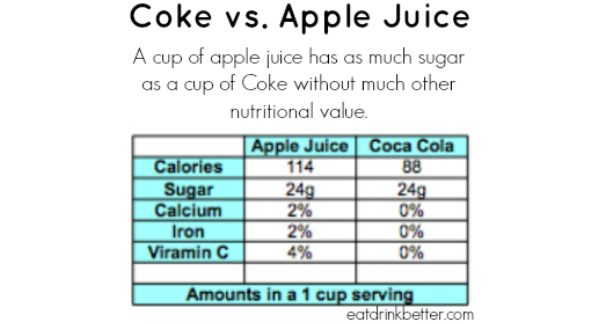
Apple juice actually has more sugar per serving than the same amount of Coca Cola. The chart below breaks down apple juice vs. Coke:
Sure, apple juice has small amounts of a few nutrients, but when you weigh that against the amount of sugar in a one cup serving, those vitamins are hardly worth it. Your child is much better off just eating an apple or other fresh, whole fruit.
Moving Beyond Apple Juice For Our Children’s Health
So, what should our kids be drinking? Water is best, of course! I know that not all kids love water, though. If your kid is used to sugary juices like apple juice, the best way to transition them is to slowly give them their juice more and more diluted. Give them as long as they need to adjust – maybe start with 3 parts juice to 1 part water, then reduce the amount of juice from there after a few days at the next unsweetness level.
I’d love to hear from the parents out there! What do your kids like to drink? My son is only a year, so right now he’s transitioning from formula to full fat soy milk. I’m lucky that he seems to really like water, too! He drinks around eight ounces of water a day, which is what the pediatrician recommended for his age.
sources: Food Safety News; Nutrition Data Apple Juice; Nutrition Data Coke
Image Credit: Child and Juice photo via Shutterstock


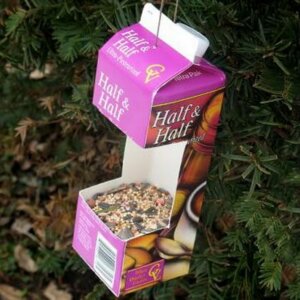
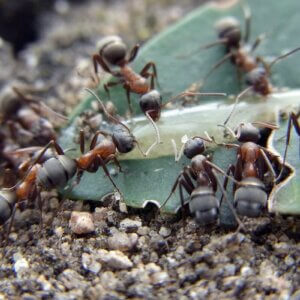
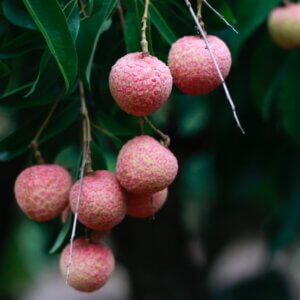
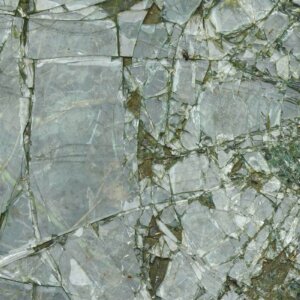
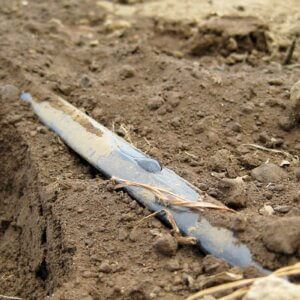

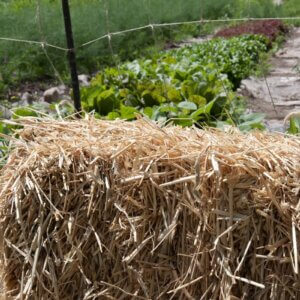

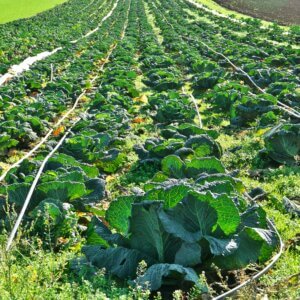

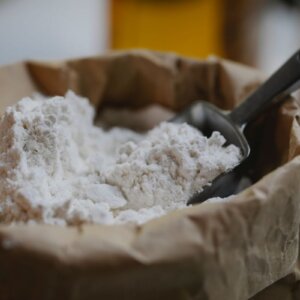




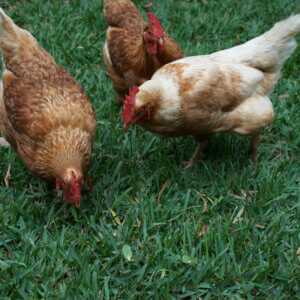


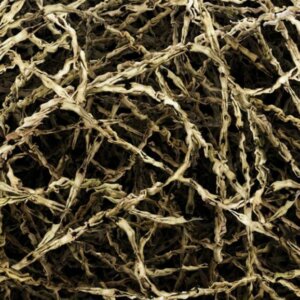
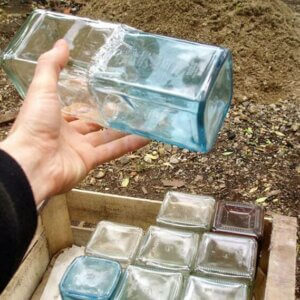

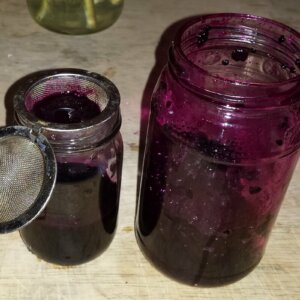
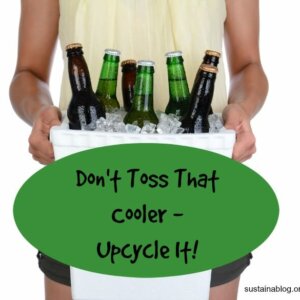


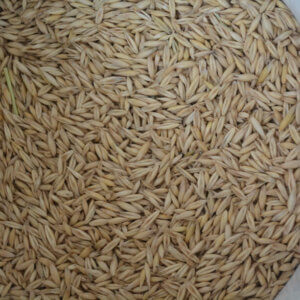
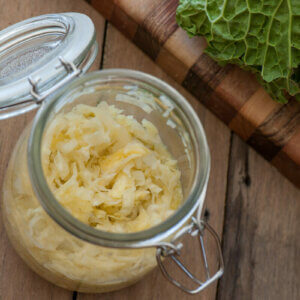


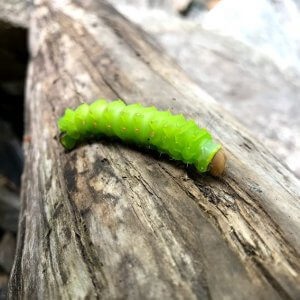
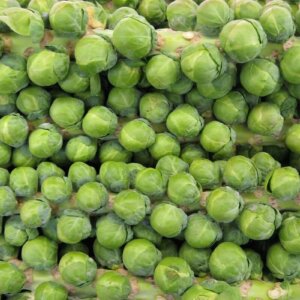

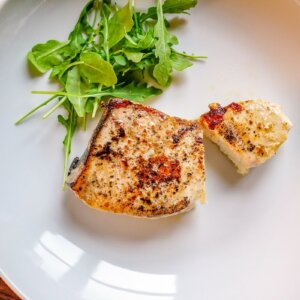




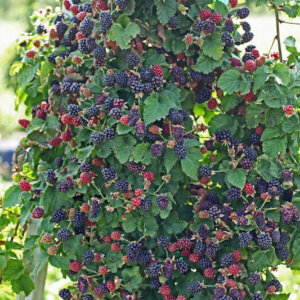
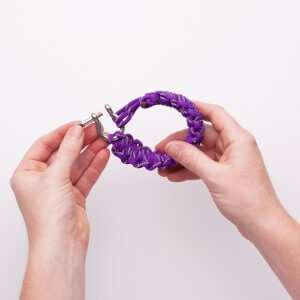
I read your article entitled “Apple Juice is Not Healthy for Kids (or for you)” and as a registered dietitian working with the Juice Products Association I would like to mention several inaccuracies. First, I’d like to stress that from 100% juice is a healthful nutrient dense beverage that contains many beneficial vitamins, minerals and phytonutrients (plant compounds). With regard to fiber, although whole fruit contains more fiber per serving than fruit juice, USDA data indicates that replacing 100% fruit juice with whole fruit increased fiber by only one-half gram (from 1.3g to 1.8g), while gaps in important nutrients we need more of, such as potassium, increased significantly across all food patterns. In fact, several studies show people who drink 100% fruit juice have higher intakes of total fiber, higher whole fresh fruit intake and better quality diets overall compared to people who do not drink 100 % fruit juice. For more information about juice please visit http://www.juicecentral.org.
I see that you work for Kellen Company, a PR firm that helps industry groups improve their image. Kellen Company also created Juice Central (which you link to as a source) for the marketing group Juice Products Association.
I have to say that I’m wary of anyone advocating for an industry that’s paying them. I will also refer you to the second image on this article – the graphic comparing apple juice to soda. That is 100% apple juice with no sugar added, and I’d hardly call 2-4% of nutritional value in just a few areas “nutrient dense,” especially when you’re getting as much sugar per serving as a sodapop.
I’m glad you agree that whole fruit contains more fiber than juice, since juices like apple juice contain no fiber at all.
I smell an industry schill. So you’re saying that it’s better to take apples (and usually the ones that are “cosmetically challenged”), process them into juice, concentrate the juice, heat it, filter it, heat it again, and then reconstitute it, than to eat an actual, honest-to-goodness apple? Good grief.
I also take issue with your website that states that “The first step in any processing procedure is inspection of the raw fruit. During this most critical step, the apples are examined by a trained inspector for “integrity and sanitary condition” and are randomly tested for spray residues or mold.”
That makes it sound like every apple is inspected, which is complete hogwash, unless you’re making extremely small batches of apple juice.
The fruit juice industry is mostly based on ways to use blemished fruit and still make a buck on it, in my opinion. I’ll give my kids real, whole fruit over any type of fruit juice anyday, unless we happen to make our own juice at home.
So from 1.3 to 1.8 – that’s nearly a 40% increase. The government recommendation is clear:
http://www.ncbi.nlm.nih.gov/pubmed/22566547
http://www.choosemyplate.gov/food-groups/fruits-tips.html
http://www.ncbi.nlm.nih.gov/pubmedhealth/behindtheheadlines/news/2013-08-30-fruit-may-lower-diabetes-risk-while-juice-may-raise-it/
http://www.hsph.harvard.edu/news/features/water-afterschool-programs/
http://news.harvard.edu/gazette/story/2013/08/reduce-type-2-diabetes-risk/
The first Harvard link is the same study as the last .gov one – though the .gov link references the peer review and offers some corrections.
I’ve seen 0 scientific studies that show juice is better, or even as good for you. I certainly don’t think it is as harmful as soda in the same quantities — However, I do think it has more potential for harm because it slides under the radar. Most people would not serve their child 4+ sodas a day, but many parents may let the apple juice flow because they see it as “healthy.”